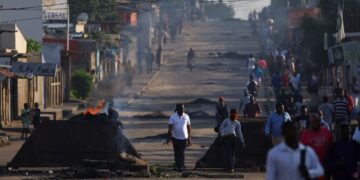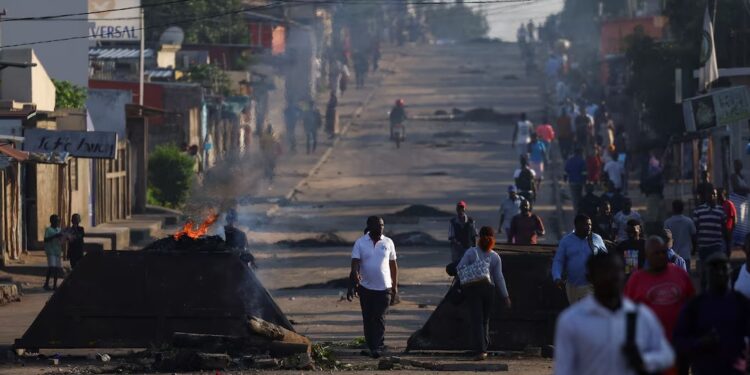By John Ikani
Mozambique’s authorities have issued a complete ban on public demonstrations following a surge of post-election violence that has resulted in numerous deaths and injuries.
The decision comes after last month’s contentious presidential election, where Frelimo, the party in power since 1975, claimed victory.
Ongoing protests over the past weeks have turned deadly, with at least 18 lives lost during clashes with security forces, according to Human Rights Watch.
Interior Minister Pascoal Ronda called on citizens to support the authorities in halting the unrest, labeling the demonstrations as “acts of terrorism.”
The unrest began late last month in Maputo, sparked by the announcement that Frelimo’s Daniel Chapo won the presidency with over 71% of the votes.
Venâncio Mondlane, the opposition contender who secured 20% of the vote, went underground before the results were released, fearing for his safety.
Mondlane alleged threats to his life after his legal adviser and an aide were killed while preparing to dispute the election outcome.
Last week, military personnel were deployed to restore order during Thursday’s protests, the most intense since the turmoil erupted on 9 October.
Police used tear gas and rubber bullets to break up large crowds of protesters who set fires and blocked roads in the city.
Minister Ronda has since announced a ban on further demonstrations, citing their “extreme nature.”
“I no longer call these protests, I call them acts of subversion and terrorism because they terrorise people and children. That woman selling bananas can no longer sell them. People can’t go to work; this is terror,” said Ronda.
He accused protest organizers of exploiting “drugged youth” to incite chaos, asserting that the government would not tolerate criminal behavior.
Rights groups, however, suggest that the actual death toll could be over 30.
A South African news channel has reported the detention of two of its journalists in Maputo, who were covering the unrest under unclear circumstances.
News Central TV issued a statement highlighting that all attempts to communicate with the detained reporters had failed.
“The detention of our colleagues while performing their professional duties is deeply concerning,” it said, adding that “we are working through all available diplomatic and official channels to secure their immediate release.”
Meanwhile, internet access across Mozambique has been heavily restricted, a move that Human Rights Watch criticized as an attempt to stifle peaceful dissent and critical voices.
Opposition parties and observers have alleged that the recent elections were neither free nor fair, accusations that the government has firmly denied.
President Filipe Nyusi is set to leave office after completing the two-term limit set by the country’s constitution.




































